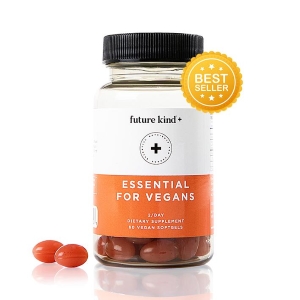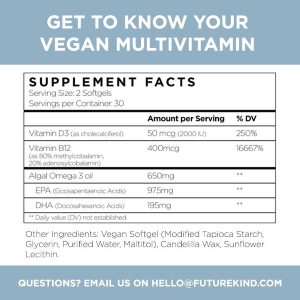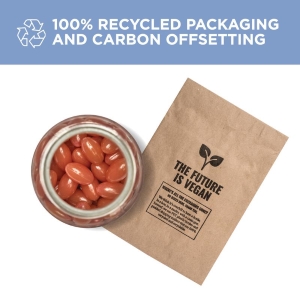In my pursuit of optimal nutrition over the past ten to fifteen years, I’ve experimented with a few different supplements but have never really bought into the hype. I have seen many of my friends tout protein, multivitamins, and fish oil. And I’ve seen advertisements and media covering mega dosing vitamins, minerals, and antioxidants. For the most part, I ignored my friends’ supplement routines and the media advertisements. Until now, when I decided to take a deep dive into supplements and explore if any supplements were worth taking. Here’s what I found:
General Supplement Consensus
According to a study in 2019, Theoretical Food and Nutrient Composition of Whole-Food Plant-Based and Vegan Diets Compared to Current Dietary Recommendations, almost all vitamins and minerals can be consumed by eating a variety of plant-based whole foods like vegetables, fruits, beans, nuts, seeds and grains. These foods are extremely nutrient dense so by filling your diet entirely with these foods, you’ll meet and exceed almost all of your macronutrient (fat, carbohydrate, protein) and micronutrient (vitamin, mineral, antioxidant, phytochemical) needs. In fact, most people living on this diet will consume two or three times their daily recommended nutrient intake of fiber, Vitamin A, Vitamin C, folate, magnesium and potassium. Therefore, this study and numerous others have found that by eating a healthy diet, there’s an incredibly good chance you won’t be vitamin deficient. Except, the study did note a Vitamin B12 and Vitamin D3 deficiency was possible. I’ll get to that in a minute.
On top of these findings that nearly all nutrients can be met with diet alone, I found that taking unnecessary supplements can be dangerous. For example, folate is necessary for proper health but taking a folic acid supplement has been shown to increase risk of breast, prostate and colorectal cancer. Instead, it’s best to get your folate from foods like brussel sprouts and spinach. Another example is Vitamin A and E. Although necessary for proper health, taking these via supplements has been linked to increased mortality, birth defects and osteoperosis. Instead, it’s best to get Vitamin A from carrots, sweet potatoes, and mango. And Vitamin E from sunflower seeds, almonds, and avocados. When you consume foods in their entirety, there are no negative side effects. This is why it’s best to avoid unnecessary supplements and their side effects when your nutrient requirements can be met with food. But are there nutrients that can’t be met with food?
What the Doctors Recommend
All of this led me to compare what the most popular whole food plant-based doctors recommend. For the most part, they were in agreeance with my findings above. Most supplements are a waste of money because they can’t be readily absorbed, they can be toxic, and they aren’t needed if eating a healthy diet. But each of them still recommended a few supplements for nutrients they felt couldn’t be met with food. Below, is a chart of what the five doctors I follow tend to recommend for the average person.
| Vitamin B12 | Vitamin D3 | DHA/EPA | Iodine | Vitamin K12 | Zinc | |
|---|---|---|---|---|---|---|
| Dr. Fuhrman | 75mcg | 2000 IU | 175mg/88mg | 150mcg | 35mcg | 9mg |
| Dr. Greger | 250mcg | 2000 IU | 170mg/80mg | 150mcg | ||
| Dr. Esselstyn | 1000mcg | 1500 IU | ||||
| Dr. Campbell | Maybe | |||||
| Dr. Barnard | 2400mcg | 2000 IU | Yes | |||
| My Take | 350mcg | 2000 IU | 175mg/88mg |
After reviewing the supplements and the reasoning behind their recommendations, I decided to develop my own educated opinion. Below, is my take on what vitamins are worth taking.
Vitamin B12
Vitamin B12 is present in microbes throughout the earth’s soil and water. It used to be easy to consume Vitamin B12 back when people drank water directly from the earth and ate food directly from the soil. But nowadays we live in a sanitized world where our water is filtered, and our food is cleaned. These processes strip out the Vitamin B12 that our bodies need making it exceedingly difficult to consume the daily recommended dose of Vitamin B12 without supplementation. Therefore, I agree that a Vitamin B12 supplement is a good idea.
When it comes to dosage, I’ve found that any excess Vitamin B12 consumed above our body’s requirements will get peed out. Because of this, it doesn’t appear to be dangerous to consume a higher dosage of B12 as the body is able to regulate it without problems. That’s why my recommendation is above Dr. Fuhrman’s and Dr. Greger’s minimum requirement of 75mcg and 250mcg, respectively. But even though there isn’t evidence that overconsumption of B12 is dangerous, I don’t like the idea of overdosing in case further research were to uncover negative side effects. That’s why I recommend shooting for 350mcg/day which is above the minimum requirements and below possible overdose levels.
In what source should you get your Vitamin B12? Studies have indicated that the body absorbs Vitamin B12 most effectively in a synthetic form of cyanocobalamin, or a natural form combination of methylcobalamin and adenosylcobalamin.
My Take: ~350mcg / day of Vitamin B12 from (cyanocobalamin) or (methylcobalamin and adenosylcobalamin)
Vitamin D3
Vitamin D3 is produced by the body when in contact with direct sunlight. Back in the hunter and gatherer era, humans were outdoors all the time and in contact with direct sunlight for hours. Because of this, a deficiency in Vitamin D3 was rare. Now though, people spend most of their time indoors. On top of that, more people are living further away from the equator where the weather isn’t as nice outside. This discourages people to go outside making the problem even worse. This has caused 42% of Americans to become deficient and why I recommend taking Vitamin D3 if optimal sun intake isn’t possible.
When it comes to dosage, I’ve found that excess Vitamin D3 can be a problem. Although the body can properly regulate Vitamin D3 via sunlight without any issue, overdosing on supplements is possible. Too much Vitamin D3 via supplements may cause kidney failure, bone loss and excess calcium in the blood. These side effects are possible with doses above 4000 IU per day. Therefore, I agree with the near consensus of the doctor recommendations above that 2000 IU per day is best.
My Take: 2000 IU / day of Vitamin D3 from (cholecalciferol)
DHA/EPA
Omega-3 fatty acids like DHA and EPA are strongly linked to brain health and prevention of dementia. Specifically, according to Dr. Fuhrman, “DHA is most often associated with brain development, learning and cognition and EPA with mood and behavior, and anti-inflammatory effects.” Omega-3 fatty acids are typically found in fish, seafood, and nuts/seeds. But, as oceans have been contaminated and polluted, heavy metals are now commonly found in fish and seafood. Because of this, and studies linking fish/seafood consumption with various diseases, its best to avoid fish and seafood. That leaves nuts and seeds as a reliable source of DHA/EPA. But it’s difficult to consume the variety and quantity of nuts and seeds needed to meet ones Omega-3 fatty acid requirements. This has caused 98% of people to become deficient and why I recommend taking a DHA/EPA supplement.
When it comes to dosage, I’ve found that excess DHA/EPA can be a problem too. Overconsumption of Omega-3 fatty acids have been linked to various forms of cancer. Therefore, many doctors recommend an upper limit of 900mg DHA and 600mg of EPA per day. While that is the upper limit, I tend to follow Dr. Fuhrman and Dr. Greger’s advice of about 175mg DHA and 88mg EPA per day.
In what source should you buy your EPA/DHA? Studies have indicated that algal oil is best. Popular fish oil supplements can still contain toxic metals like mercury and promote ever-present overfishing. Also, fish get their Omega-3’s from consuming algae so why not get yours directly from the source too?
My Take: 175mg and 88mg / day of DHA and EPA from (Algal Oil)
My Recommendation
Based on my research findings, I set out to find one multivitamin that contained these exact ingredients. Surprisingly, it was difficult. While it’s easy to find three separate supplements for B12, D3 and DHA/EPA, I didn’t want to deal with that. I’m a minimalist. I know it’s easier, more sustainable, and more convenient to only worry about one pill per day. And I didn’t want the typical multivitamin that many suppliers sell which include numerous other dangerous ingredients like Vitamin A, Vitamin E and Folic Acid. So, after spending hours researching, I finally found a supplement that matched my criteria.
Future Kind sells an Essential Vegan Multivitamin that only contains Vitamin B12, Vitamin D3 and DHA/EPA. Bingo. This is what I was looking for. On top of that, its dosage was nearly identical to what I wanted. I also reached out to the company to verify their supplement testing practices as nutrition label accuracy is a major concern in the supplement industry and I was satisfied with their response. And, to top it off, their bottles are made in the United States from recycled materials. This combination of meeting my supplement requirements and supporting the environment is what sold me on their product. I’m now in the process of starting my Future Kind subscription to meet my daily nutrition requirements. This supplement should help support energy levels, enhance focus, increase immunity, support longevity, and promote healthy bones. I’m excited I’ve found a product that matches my needs and I recommend you check them out if you’re in a similar boat.
Note: I did buy Vedge Nutrition supplements at first before discovering Future Kind. Vedge Nutrition came with 1000mcg of Vitamin B12 which was higher than I wanted, and it was solely sourced from methylcobalamin. Vedge Nutrition supplements were closer to my DHA/EPA requirements than Future Kind but the difference was small. Because of this, I’m switching from Vedge Nutrition to Future Kind.
Final Thoughts
There’s a lot of noise, false claims, and bad advice out there when it comes to supplements. It seems like everybody is taking something without knowing the exact reasoning. And nearly all of your nutritional requirements can be meet with a healthy diet. That’s why I avoid taking supplements I don’t need and only consume the ones I do. It’s hard to consume Vitamin B12 in this sanitized world. It’s hard to be outside enough to meet Vitamin D3 requirements. And it’s hard to get proper Omega-3 fatty acids without consuming heavy metals from fish and seafood. Therefore, I’ve decided it’s best to take a supplement to meet these three needs. Future Kind is the brand I’ve chosen and now recommend. Don’t live your life with nutritional deficiencies that could cause depression, low energy levels, and dementia. Take one supplement a day that gives you the best chance to live your healthiest and happiest life.
If you liked this post, please subscribe to the weekly newsletter and follow the social media accounts for the latest content!

Hey, I am Brandon Zerbe
Welcome to myHealthSciences! My goal has always been to increase quality-of-life with healthy habits that are sustainable, efficient and effective. I do this by covering topics like Fitness, Nutrition, Sleep, Cognitive Health, Financial Independence and Minimalism. You can read more about me here.
Sources:
- Fuhrman: Why Take a Multivitamin; What to Take; What Not to Take
- Greger: Supplements
- Greger: Optimum Nutrition Recommendations
- Esselstyn: Vitamins – What Vitamins should I take?
- Esselstyn: Latest Basic Recommendations
- Campbell: Do You Need Vitamin Supplements?
- Barnard: These Are The Supplements Every Vegan Should Take, According To Experts
- Barnard: Why We Need Vitamin D, And How To Get Enough
- Theoretical Food and Nutrient Composition of Whole-Food Plant-Based and Vegan Diets Compared to Current Dietary Recommendations
- Methylcobalamin vs. Cyanocobalamin: What’s the Difference?
- 42% Percent of Americans Are Vitamin D Deficient. Are You Among Them?
- 6 Side Effects of Too Much Vitamin D
- Heavy Metals in Fish
- Are You One of the 2% with Adequate Omega-3 Levels?
- All About Algae Supplements
- The Need for DHA by Vegans
- Picking the Right Multivitamin is Paramount As Most May Be Harmful to Your Health
- Fueling the Vegetarian (Vegan) Athlete
Disclosure: I frequently review or recommend products and services that I own and use. If you buy these products or services using the links on this site, I receive a small referral commission. This doesn’t impact my review or recommendation.



